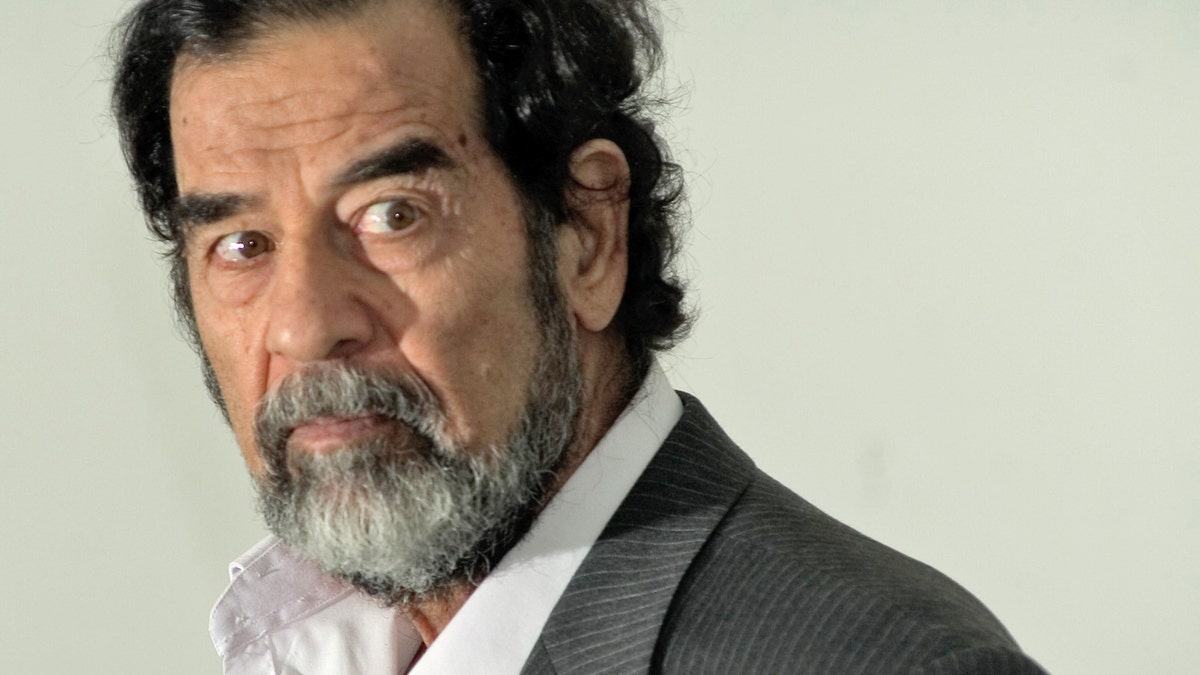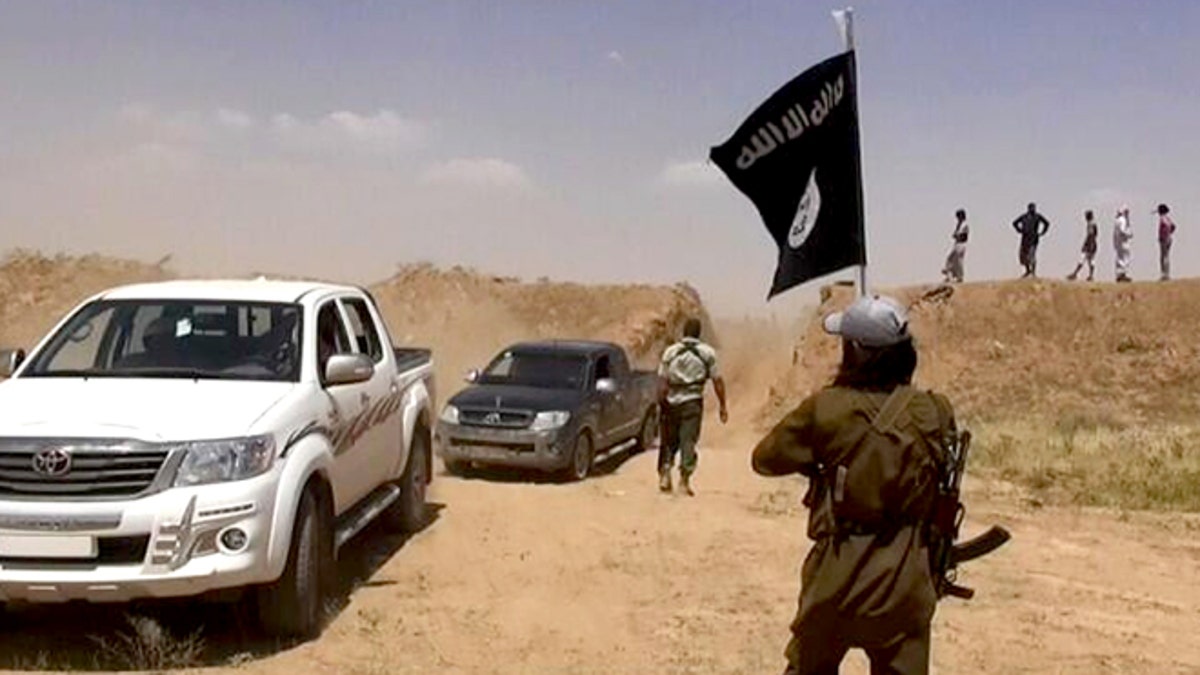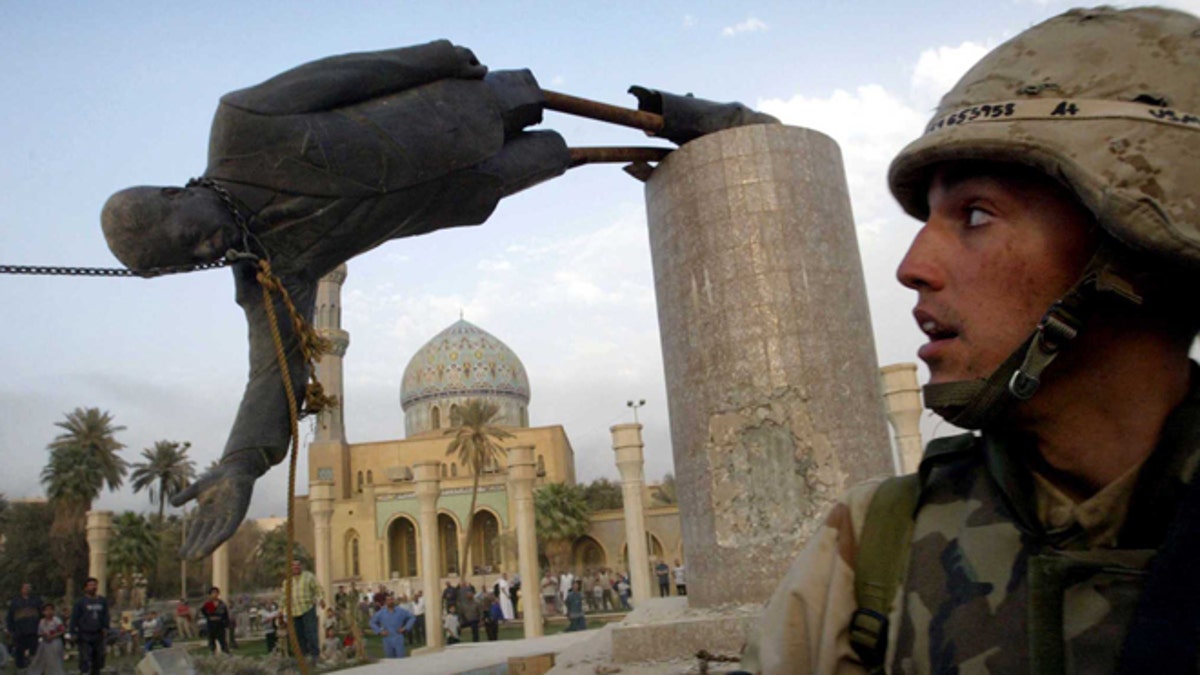
Paul Bremer reflects on what worked and what did not, almost 15 years since the U.S invasion of Iraq
Paul Bremer is not well known in his own country, but in Iraq, the longtime American diplomat is a household name.
It was Bremer, as head of the Coalition Provincial Authority, who led Iraq for just over a year in the early stages of the U.S. occupation in 2003. In the years, critics of the U.S invasion have faulted Bremer-led policies for the chaos and instability that followed for more than a decade.

The years following Saddam Hussein's rule were chaotic for Iraq
From the purge of longtime dictator Saddam Hussein's Baath Party to the dismantling of the Iraqi Army, U.S. policies implemented under Bremer are sometimes blamed for everything from dissolution of civil society in Iraq to the 2014 rise of ISIS. Yet, despite the tremendous cost in lives and money, much has worked.
In an exclusive interview with Fox News, Bremer reflected on the lessons learned almost 15 years since the Iraq war began – what went right and what went wrong – and the role the U.S. can play in preventing another ISIS-like insurgency.
Fox News: Looking back at your governance of Iraq and what has happened since then, what worked and what did not?
BREMER: The unwritten story of Iraq is how successful they have been despite all the problems, ISIS and everything else. Here is a country that has held four elections, a referendum, and provincial elections. When (current Prime Minister) Haider Alabadi came into the position (in August, 2014) it was the fourth successful peaceful transfer of power in Iraq, which is pretty much a record in the Arab world, perhaps with the exception of Lebanon. They wrote a Constitution and they got it approved, and they have been following the Constitution in terms of its electoral provisions.
In Iraq’s history, it’s the first time and in the Arab world, that is pretty unusual. Their political commitment to trying to have a representative government is pretty impressive.
Fox News: Nonetheless, people often look back at the Iraq war as a mistake.
BREMER: It seems to me that the conventional wisdom about Iraq being a big mistake is not focusing on the facts on the ground. In fairness, one also has to add that they – like all of the oil producers – have really been hammered by the drop in the oil price. They still get something like 90 percent of the government revenues from oil. So the economic pressures, which affect everything else, has also been a problem.
Security also continues to be a big problem. The lesson there we have been through. I felt we were understaffed on security right from the start. That problem was not really fixed until 2007 when President Bush changed strategy, and implemented the Counter Terrorism (CT) strategy which defeated Al Qaeda in Iraq by the end of 2008, so effectively in 2009 when the new administration came in, the President said they inherited a relatively stable and peaceful Iraq which was true – as of 2009.

ISIS took control of a third of Iraq after the U.S withdrawal (AP/Albaraka News)
Fox News So in your view, what then went wrong?
BREMER: The big mistake then was pulling the troops out in 2011, which opened the door for ISIS to come in and take over a third of the country. President Obama realized that was a mistake and began the buildup again that has led us to where we are now and has kept the training going for the Iraqi counter-terrorism units. So we are back again to a more stable Iraq. So where to go from here?
The thing that didn’t work was America effectively withdrawing its visible and political support of the Iraqi government in 2011. We needed to have a sustained commitment to helping the Iraqis develop their own forces and train them to defeat first Al-Qaeda and then ISIS, which is effectively Al Qaeda version two. We can’t repeat that mistake.
Fox News: Critics often point fingers at the policy of “de-Baathification” in Iraq, which was ushered in under your watch and subsequently left scores of well-trained Baath party leaders without jobs or prospects, and many in turn became ISIS. What should you have done differently?
BREMER: There was no question there was going to be a heavy degree of ‘de-Baathifcation.’ That is what all Iraqis consulted by the State Department before the invasion said. That order was drafted in Washington before I even came into government. But I did make a mistake, and that was turning over the implementation to the Iraqi Governing Council which then put in place a de-Baathification committee that expanded very gravely the actual scope of the order.
Reconciliation is always the hardest thing in any post-conflict situation and effectively dealing with the Baath party involves the question of reconciliation.
Fox News: There are widespread concerns that Tehran has too much influence in Baghdad. Is this something you foresee as a big problem going forward?
BREMER: The significant Iranian involvement, particularly through the Popular Mobilization Units (PMU) poses a real challenge for Baghdad. The question now that the job of defeating ISIS is largely done, what do we do with them? There are more than 100,000. It raises the issue of reconciliation, and that goes in two dimensions – there is the ethnic dimension of Kurds and Arabs, and the sectarian dimension of Shia and Sunnis. The large-scale Iranian presence, particularly through the security forces, complicates that problem for the Prime Minister.
Fox News: There are a lot of arguments for the notion that a unified Iraq won’t work, thus the Kurds – and others – are making a case for Iraqi to be broken up. Could this improve the security situation, or make it worse?

The toppling of the Saddam Hussein statue in Baghdad, 2003 (Reuters)
BREMER: I think it would lead to a worse situation. If Iraq breaks up – and the most visible place that could happen is if the Kurds were to carry out their program of seceding from Iraq – two things will be of consequence. First of all, it is likely to provoke internal disruption within the rest of Iraq. Second, it is likely to bring in some of the neighboring countries. Turkey and Iran, both of who have some very large and uncomfortable Kurdish minorities. Neither of those countries are going to tolerate an independent Kurdistan, and it would probably draw them in more than they already are, so I don’t think it is a very good idea.
Fox News: After the Shia Muslim Nouri Al-Maliki came into office in 2006, did you have any indications into the type of sectarianism he promoted?
BREMER: If you look at what Al-Maliki did, he came to Washington and learned from President Obama that we were going to withdraw at the end of 2011. He then did three things. He went home and put an arrest warrant out for his senior Vice President Tariq al-Hashimi, who is still in exile in Turkey. He cut off cooperation with the Kurds [and] didn’t send them their money. And most importantly, he began a large-scale purge of the American-trained Iraqi Army.
I have heard from Iraqis that the purge tended to go in the direction of putting Shia-supporters of Al-Maliki into Officer level positions which goes a fair way to explaining how an American-trained army, which defeated Al Qaeda, suddenly collapsed when ISIS took Mosul.
Fox News: Now with ISIS officially defeated territorially in Iraq, should the U.S. maintain a presence there long-term?
BREMER: I think we should make it clear to the Iraqi Government and to its neighbors that we intend to stay there as long as the Iraqi government wants us to be there. How long that is, I don’t know. But it is in America’s interests. We are not just doing it as a favor to the Iraqis. In our interests, we have invested a great deal in Iraq. It has by-and-large been successful in terms of its political structure, the economy is a problem but that is not something we did wrong or the Iraqis did wrong, that is the world oil market. We should be prepared to stay and defend those successes as long as the Iraqi government wants us to be there.
Fox News: Reflecting on your time governing Iraq, despite all that may have gone wrong, of which aspect are you most proud today?
BREMER: I think helping the Iraqis realize and then draft a modern Constitution with checks and balances, some path to a representative government chosen by the Iraqi people. That Constitution they are still following, and that was the most successful thing we did.
And Iraqis themselves don’t get as much credit for what they have done, particularly in the heroism they showed in those first couple of elections when Al Qaeda was saying, ‘you vote we kill you.’ But they still went out there with their purple fingers. We all remember it. They are tough people.
